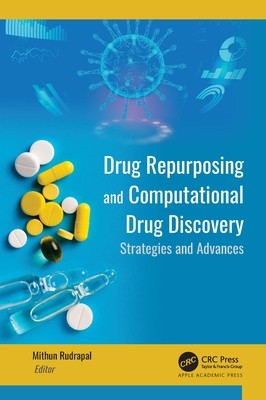
- We will send in 10–14 business days.
- Publisher: Apple Academic Press
- ISBN-10: 1774912775
- ISBN-13: 9781774912775
- Format: 15.6 x 23.4 x 1.8 cm, hardcover
- Language: English
- SAVE -10% with code: EXTRA
Drug Repurposing and Computational Drug Discovery (e-book) (used book) | bookbook.eu
Reviews
Description
This new volume presents exciting recent advances in drug repurposing and computational approaches for the discovery and development of drugs against certain difficult-to-treat and life-threatening diseases, including microbial infections, parasitic diseases, brain disorders, and cancer. Drug repurposing is defined as identifying new pharmacological indications from old, existing, failed, investigational, already marketed, or FDA approved drugs/pro-drugs, and the application of these newly developed drugs to the treatment of diseases other than the drug's original intended therapeutic use. The application of computational techniques in discovery research does not only help in the development of drugs from leads or existing drug molecules, but also can be of useful for the repurposing of existing drug candidates. This book is primarily aimed at delivering information on various computational techniques, tools, and databases being utilized for drug repurposing and for identifying the uses of existing drug candidates on different emerging or deadly diseases.
With contributions from a global team of experts (academicians, scientists, and researchers), this volume, Drug Repurposing and Computational Drug Discovery: Strategies and Advances, explores the sophisticated tools and techniques of drug repurposing and computational drug discovery. It provides up-to-date and in-depth information on the state-of-the-art strategies and techniques being utilized for the discovery of therapeutic candidates from existing natural leads, synthetic compounds, and/or drug molecules by experimental (in vitro, in vivo) as well as computational (in silico) techniques. Drug repurposing and computational approaches addressed in the book target the discovery and development of drugs for microbial infections (bacterial, fungal, viral, COVID-19), parasitic diseases and neglected tropical diseases (NTDs), malignant diseases (cancer), inflammatory diseases, cardiovascular disorders, diabetes, and aging and neurological (CNS) disorders. In addition, the challenges and regulatory issues encountered in drug repurposing and computational drug discovery programs are looked at, offering perspectives for future directions.
In addition, the challenges and regulatory issues encountered in drug repurposing and computational drug discovery programs are looked at, offering perspectives for future directions.
Key highlights of the book:
- Presents cutting-edge strategies currently available in drug repurposing-based and computational drug discovery programs
- Looks at potential advantages and clinical utilities of drug repurposing in the treatment of infectious illness, malignant diseases, and rare and difficult-to-treat diseases
- Discusses drug discovery approaches using natural sources, phytochemicals, synthetic derivatives, existing drugs, or lead molecules by computational/database screening and experimental screening
- Considers the legal regulations and ramifications of drug repurposing
The volume will be a useful resource to those working in the area of drug discovery and development research, such as drug discovery scientists, medicinal chemists, pharmacologists, toxicologists, phytochemists, biochemists, clinicians, R&D personnel, researchers, healthcare professionals students, teachers, and many others.
EXTRA 10 % discount with code: EXTRA
The promotion ends in 19d.15:44:49
The discount code is valid when purchasing from 10 €. Discounts do not stack.
- Publisher: Apple Academic Press
- ISBN-10: 1774912775
- ISBN-13: 9781774912775
- Format: 15.6 x 23.4 x 1.8 cm, hardcover
- Language: English English
This new volume presents exciting recent advances in drug repurposing and computational approaches for the discovery and development of drugs against certain difficult-to-treat and life-threatening diseases, including microbial infections, parasitic diseases, brain disorders, and cancer. Drug repurposing is defined as identifying new pharmacological indications from old, existing, failed, investigational, already marketed, or FDA approved drugs/pro-drugs, and the application of these newly developed drugs to the treatment of diseases other than the drug's original intended therapeutic use. The application of computational techniques in discovery research does not only help in the development of drugs from leads or existing drug molecules, but also can be of useful for the repurposing of existing drug candidates. This book is primarily aimed at delivering information on various computational techniques, tools, and databases being utilized for drug repurposing and for identifying the uses of existing drug candidates on different emerging or deadly diseases.
With contributions from a global team of experts (academicians, scientists, and researchers), this volume, Drug Repurposing and Computational Drug Discovery: Strategies and Advances, explores the sophisticated tools and techniques of drug repurposing and computational drug discovery. It provides up-to-date and in-depth information on the state-of-the-art strategies and techniques being utilized for the discovery of therapeutic candidates from existing natural leads, synthetic compounds, and/or drug molecules by experimental (in vitro, in vivo) as well as computational (in silico) techniques. Drug repurposing and computational approaches addressed in the book target the discovery and development of drugs for microbial infections (bacterial, fungal, viral, COVID-19), parasitic diseases and neglected tropical diseases (NTDs), malignant diseases (cancer), inflammatory diseases, cardiovascular disorders, diabetes, and aging and neurological (CNS) disorders. In addition, the challenges and regulatory issues encountered in drug repurposing and computational drug discovery programs are looked at, offering perspectives for future directions.
In addition, the challenges and regulatory issues encountered in drug repurposing and computational drug discovery programs are looked at, offering perspectives for future directions.
Key highlights of the book:
- Presents cutting-edge strategies currently available in drug repurposing-based and computational drug discovery programs
- Looks at potential advantages and clinical utilities of drug repurposing in the treatment of infectious illness, malignant diseases, and rare and difficult-to-treat diseases
- Discusses drug discovery approaches using natural sources, phytochemicals, synthetic derivatives, existing drugs, or lead molecules by computational/database screening and experimental screening
- Considers the legal regulations and ramifications of drug repurposing
The volume will be a useful resource to those working in the area of drug discovery and development research, such as drug discovery scientists, medicinal chemists, pharmacologists, toxicologists, phytochemists, biochemists, clinicians, R&D personnel, researchers, healthcare professionals students, teachers, and many others.


Reviews